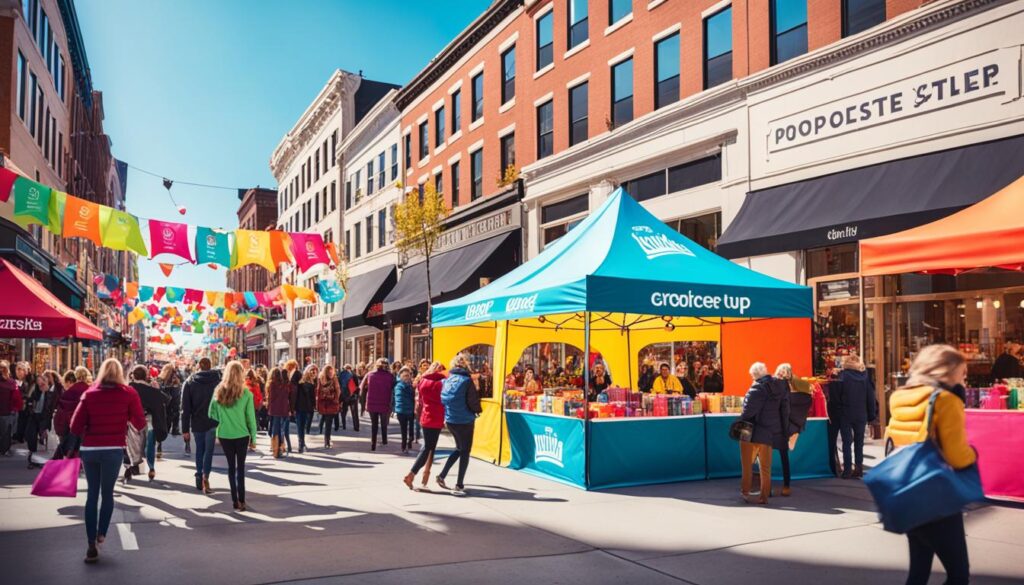Running a small business can be challenging, especially when it comes to marketing and increasing online visibility. Limited budgets often restrict small businesses from implementing extensive SEO strategies. However, it doesn’t mean that small businesses can’t compete with big brands in the online arena. With the right approach, small businesses can still achieve remarkable results with cost-effective SEO tactics.
Key Takeaways:
- Small businesses can boost their online presence without breaking the bank by implementing affordable SEO strategies.
- Targeting local SEO through geo-specific keywords can drive relevant traffic to small business websites.
- Optimizing local directory listings on platforms like Google Business Profile and Yelp improves online visibility.
- Hosting local sales events or pop-ups can attract potential customers and create online momentum.
- Leveraging search-driven social media platforms helps small businesses connect with their target audience.
Drive Traffic via Geo-Specific Keywords
Small businesses can significantly enhance their online presence and attract relevant traffic by implementing effective local SEO strategies. One key tactic is the utilization of geo-specific keywords, which are keywords that are specific to a particular location or geographic area.
By conducting thorough keyword research, small businesses can identify relevant geo-specific keywords that have moderate to low competition. These keywords can then be strategically incorporated into website content, including page titles, headings, meta tags, and within the body of the text itself.
However, it’s important to strike a balance between optimization and user experience. Keyword usage should be natural, informative, and not overly forced. Ultimately, the goal is to create valuable and engaging content that aligns with the interests and needs of the target audience.
Using geo-specific keywords allows small businesses to target potential customers who are actively searching for products or services within a specific geographic area. For example, a local bakery in New York City could optimize its website for keywords such as “best bakery in NYC” or “New York City dessert delivery.”
This targeted approach increases the visibility of a small business in local search results, enabling them to stand out from the competition and attract highly relevant organic traffic.
“Implementing geo-specific keywords is a powerful strategy for small businesses to strengthen their local SEO efforts and drive targeted traffic to their websites. By aligning their content with the geographic locations they serve, small businesses can position themselves as the go-to option for potential customers.”
Benefits of Using Geo-Specific Keywords for Local SEO:
- Improved visibility in local search results
- Increased organic traffic from users searching within a specific geographic area
- Enhanced targeting of potential customers interested in local products or services
- Competitive advantage over larger businesses that may not prioritize local SEO
- Opportunity to build a strong local brand presence and reputation
| Local SEO Strategy | Benefits |
|---|---|
| Utilizing geo-specific keywords | Increased visibility in local search results |
| Creating location-specific landing pages | Targeted content for specific geographic areas |
| Optimizing Google My Business profile | Enhanced local online presence |
| Acquiring positive online reviews | Influencing potential customers and building trust |
Implementing geo-specific keywords is just one component of an effective local SEO strategy. Small businesses should also consider creating location-specific landing pages, optimizing their Google My Business profile, and encouraging customers to leave positive online reviews. By combining these tactics, small businesses can maximize their online visibility, attract local customers, and ultimately drive growth.

Optimize Local Directory Listings
Small businesses can greatly enhance their online visibility by optimizing their local directory listings. Consumers commonly use platforms like Google Business Profile, Bing Places for Business, Yelp, and The Real Yellow Pages to find local businesses. By ensuring that these listings are accurate, up-to-date, and regularly maintained, small businesses can significantly enhance their chances of ranking well in local search results. Positive reviews from satisfied customers also play a crucial role in boosting local visibility and building trust with potential buyers.
Optimizing local directory listings involves providing complete and accurate information about your business, including its name, address, phone number, and website. It’s important to ensure that this information is consistent across all platforms to avoid confusing potential customers and search engines. Additionally, small businesses should utilize relevant keywords in their directory listings to further improve their online visibility.
Regularly updating and managing local directory listings is essential for maintaining a strong online presence. This includes responding to customer reviews and addressing any concerns promptly and professionally to maintain a positive reputation. By actively engaging with customers and encouraging them to leave positive reviews, small businesses can not only boost their rankings in local search results but also establish trust and credibility with potential customers.
Benefits of Optimizing Local Directory Listings:
- Increased online visibility in local search results
- Improved local rankings on search engines
- Enhanced trust and credibility with potential customers
- Greater brand exposure to a targeted local audience
- Higher chances of attracting local customers who are searching for specific products or services
By optimizing local directory listings and actively managing customer reviews, small businesses can effectively boost their online visibility and attract more local customers.
Effective local directory listing optimization requires consistent effort and attention to detail. Small businesses should regularly monitor their listings, respond to customer reviews, and update their information to stay relevant and competitive in the local market.
| Local Directory | Online Visibility | Positive Reviews |
|---|---|---|
| Google Business Profile | Increases online visibility on Google search | Positive reviews help build trust |
| Bing Places for Business | Boosts visibility on Bing search | Customer reviews influence local rankings |
| Yelp | Popular platform for local business searches | Positive reviews attract potential customers |
| The Real Yellow Pages | Well-known directory for local businesses | Positive reviews contribute to online reputation |
Optimizing local directory listings is a cost-effective strategy for small businesses to improve their online visibility and attract local customers. By utilizing platforms such as Google Business Profile, Bing Places for Business, Yelp, and The Real Yellow Pages, small businesses can enhance their online presence and gain a competitive edge in their local market.
Host Local Sales Events or Pop-ups
Hosting local sales events or pop-ups can be an effective way for small businesses to attract potential customers and increase their online presence. By promoting these events through social media, local advertising, and targeted keywords, small businesses can generate online buzz and attract local shoppers. Creating online momentum by using SEO strategies such as targeting keywords related to local events and driving local traffic can help small businesses maximize the impact of their sales events.
“Hosting local sales events or pop-ups allows small businesses to engage directly with their local community,” says Sarah Johnson, CEO of a local marketing agency. “These events provide a unique opportunity for businesses to showcase their products or services and build rapport with potential customers.”
By organizing sales events or pop-ups, small businesses can create a sense of urgency and exclusivity, enticing customers to visit their physical or online stores. These events can feature limited-time discounts, special promotions, or giveaways to incentivize customer participation and drive sales.
To effectively promote local sales events or pop-ups, small businesses can leverage their online presence and social media platforms. By using geo-specific keywords in their promotional content, such as “upcoming sales event in [city name],” businesses can attract local shoppers searching for event information online.
Additionally, small business owners can partner with local influencers or bloggers who have a strong online following in the area. Collaborating with these individuals can help spread the word about the event and create additional online buzz.
Furthermore, optimizing the event’s landing page or website with relevant keywords and local information can improve its visibility in search engine results. This will ensure that potential customers searching for local events or sales opportunities are more likely to discover the business’s event information.
Hosting local sales events or pop-ups not only allows small businesses to drive immediate sales but also helps create long-term customer loyalty. By delivering exceptional customer experiences and showcasing the value of their products or services, businesses can build lasting relationships with their local customer base.

Creating a sense of community and belonging is crucial for small businesses, and hosting local events or pop-ups offers the perfect opportunity to achieve that. Through these events, businesses can strengthen their connection with the local community and establish themselves as go-to destinations for residents.
Overall, hosting local sales events or pop-ups can significantly impact a small business’s online momentum. By leveraging SEO strategies, targeting local keywords, and generating online buzz, businesses can attract new customers, increase brand visibility, and elevate their online marketing efforts.
| Benefits of Hosting Local Sales Events or Pop-ups | Strategies for Promoting Local Events |
|---|---|
|
|
Leverage Search-Driven Social Platforms
In addition to Google, small businesses can expand their online reach by leveraging popular search-driven social media platforms. These platforms, such as LinkedIn, YouTube, TikTok, and Pinterest, utilize powerful search algorithms to connect users with relevant businesses and content. By optimizing their presence on these platforms, small businesses can tap into a vast pool of potential customers and drive organic traffic to their websites.
Each social media platform has its own unique strategies and best practices for maximizing visibility and engagement. Small businesses should conduct thorough research to understand the preferences and behaviors of their target audience on each platform. By tailoring their content and adopting effective posting strategies, they can increase their chances of reaching and resonating with local shoppers.
LinkedIn is well-suited for business professionals and B2B marketing. It allows small businesses to showcase their expertise and network with like-minded individuals in their industry. By sharing valuable insights, participating in industry discussions, and utilizing geo-specific keywords, small businesses can establish themselves as authorities and attract potential customers and partners.
YouTube
YouTube, the world’s second-largest search engine, offers vast opportunities for video content marketing. Small businesses can create informative and engaging videos that highlight their products, services, or expertise. By optimizing their video titles, descriptions, and tags with geo-specific keywords, small businesses can increase their visibility in YouTube search results and attract viewers who are interested in their niche.
TikTok
TikTok is a rapidly growing platform that allows businesses to connect with a younger, highly engaged audience through short-form videos. With its powerful search feature, small businesses can reach local shoppers by creating entertaining and relatable content that showcases their products or services. By using popular hashtags, collaborating with influencers, and engaging with the TikTok community, small businesses can gain exposure and drive traffic to their online stores.
Pinterest is a visual discovery platform that allows users to find inspiration, ideas, and products. Small businesses can leverage Pinterest by creating visually appealing pins with thorough descriptions that include geo-specific keywords. By optimizing their pins for search and utilizing relevant boards, small businesses can increase their visibility, attract local shoppers, and drive traffic to their website.
Overall, utilizing search-driven social media platforms is a powerful strategy for small businesses to expand their online presence, reach their target audience, and generate organic traffic. By understanding the unique features and best practices of each platform, small businesses can tailor their content and engage with local shoppers effectively.
Conclusion
Small businesses can achieve online marketing success on a tight budget by implementing affordable SEO strategies. Despite limited resources, there are practical techniques that can help small businesses compete with bigger brands and increase their online visibility.
Targeting local SEO is a crucial step for small businesses. By using geo-specific keywords and optimizing their website content, small businesses can attract local customers who are actively searching for products or services in their area.
In addition, optimizing local directory listings is essential for improving online visibility. Platforms like Google Business Profile, Bing Places for Business, Yelp, and The Real Yellow Pages are widely used by consumers, so ensuring accurate and up-to-date listings can significantly impact search rankings.
Hosting local sales events or pop-ups is another effective strategy for small businesses. By promoting these events through various channels, such as social media and targeted keywords, small businesses can generate online momentum, attract local shoppers, and boost their online presence.
Lastly, leveraging search-driven social platforms, such as LinkedIn, YouTube, TikTok, and Pinterest, enables small businesses to connect with their target audience using geo-specific keywords. By tailoring their content to appeal to local interests, small businesses can attract organic traffic and boost their online visibility even further.
With the right combination of local SEO, optimized directory listings, well-executed events, and effective social media strategies, small businesses can overcome budget constraints and achieve significant online marketing success. By implementing these affordable SEO techniques, small businesses can make a big impact in the competitive online marketplace.
FAQ
How can small businesses drive traffic using geo-specific keywords?
Small businesses can drive traffic by conducting keyword research and identifying relevant geo-specific keywords with medium to low competition. By optimizing their website content with these keywords, they can increase visibility in local search results and attract potential customers in specific geographic locations.
How can small businesses optimize their local directory listings?
Small businesses can optimize their local directory listings by ensuring that platforms such as Google Business Profile, Bing Places for Business, Yelp, and The Real Yellow Pages have accurate and up-to-date information. Regularly updating these listings and encouraging positive customer reviews also improves visibility in local search results and builds trust with potential buyers.
Are local sales events or pop-ups effective in increasing online presence for small businesses?
Yes, hosting local sales events or pop-ups can be an effective way for small businesses to attract potential customers and increase online presence. By promoting these events through social media, local advertising, and targeted keywords, small businesses can generate online buzz and attract local shoppers, maximizing the impact of their sales events.
How can small businesses leverage search-driven social platforms?
Small businesses can leverage search-driven social media platforms such as LinkedIn, YouTube, TikTok, and Pinterest to connect with their target audience. By using geo-specific keywords in their posts and videos, small businesses can reach local shoppers and generate organic traffic. Each platform has its own strategies and best practices, so research and tailoring content accordingly is essential to appeal to local interests.
How can small businesses achieve online marketing success on a tight budget?
Small businesses can achieve online marketing success on a tight budget by implementing affordable SEO strategies. This includes targeting local SEO, optimizing directory listings, hosting local events, leveraging search-driven social platforms, and following SEO best practices. With creativity, dedication, and the right strategy, small businesses can compete with bigger brands and increase their online visibility.
Source Links
- https://www.entrepreneur.com/growing-a-business/how-to-use-seo-like-a-big-business-on-a-small-business/468092
- https://www.searchenginewatch.com/2020/06/04/seo-on-a-shoestring-budget-what-small-business-owners-can-do-to-win/
- https://drumcreative.com/seo/4-seo-tactics-for-small-businesses-with-a-tight-budget/








